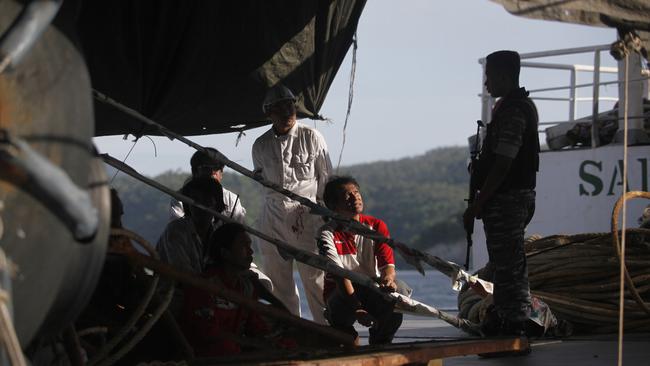Nestle faces class action lawsuit over alleged slave labour used to produce Fancy Feast
SURE, Nestle’s Fancy Feast cat food keeps your pet happy, but it may come at a horrendous cost. We’re not talking about money.

NESTLE is facing a major class action over allegations the Swiss company uses slave labour and human trafficking to produce its popular Fancy Feast cat food.
An investigation published last week by the New York Times revealed systematic abuse of workers, mainly men and boys from Cambodia and Myanmar, trafficked over the border with the promise of work and held in bondage on Thai fishing boats.
Boys as young as 15, many of whom don’t even know how to swim, work 20-hour days in dangerous and filthy conditions on unregistered “ghost ships”, and suffer beatings or even murder for minor transgressions.
According to a 2009 United Nations survey of 50 Cambodian men and boys sold to Thai fishing boats, 29 said they had witnessed their captain or a crew member kill a worker. The slaves were sold to the fishing boats for about 10,000-15,000 baht each — roughly $390-$590.
“Life at sea is cheap,” Human Rights Watch’s Asia division deputy director Phil Robertson told the New York Times. “And conditions out there keep getting worse.”
Most survive on a single bowl of rice a day, and serious infections from open sores constantly exposed to the elements are rife.
“By hiding this from public view, Nestle has effectively tricked millions of consumers into supporting and encouraging slave labour on floating prisons,” said Steve Berman, managing partner of US law firm Hagens Berman.
“It’s a fact that the thousands of purchasers of its top-selling pet food products would not have bought this brand had they known the truth — that hundreds of individuals are enslaved, beaten or even murdered in the production of its pet food.”

The Thai military and authorities have been accused of doing little to crack down on unlawful behaviour on the high seas, and even taking bribes from fishing captains.
Some deckhands report being fed amphetamines to make them work harder, while others talk of being left on so-called “prison islands” — sparsely inhabited, often inaccessible islands dotting the South China Sea — in between voyages to prevent them escaping.
Former captive San Oo, 35, told the New York Times on his first day, his captain had warned he had killed the man Mr Oo was replacing. “If you disobey or run or get sick I will do it again,” he claims the captain told him.
Nestle didn’t deny the allegations in an email on Sunday to The Associated Press but said its guidelines require suppliers to respect human rights. It outlined steps Nestle has taken to rid forced labour from its seafood supply chain.
Most of the fish caught by the slave ships is destined for the Songkla Canning Public Company, a subsidiary of Thai Union Frozen Products, Thailand’s largest seafood company and Nestle’s major supplier.
The lawsuit accuses Nestle of violating the California Unfair Competition Law, Consumers Legal Remedies Act and False Advertising Law.
“Nestle had the resources to combat this and could have — should have — chosen not to support these egregious human rights violations,” Mr Berman said.
“Nestle has failed to uphold its responsibility to ensure the absence of slave labour in its supply chains — and even worse, Nestle not only supported these human rights violations, but forced consumers to unknowingly do the same.”
The use of slave labour in the seafood industry is rife throughout South East Asia. Earlier this year, AP revealed Burmese slaves were being shipped through Thailand to work on Indonesian fishing boats.



